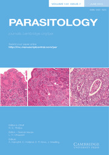
PARASITOLOGY
Scope & Guideline
Navigating the intricate world of parasites and hosts.
Introduction
Aims and Scopes
- Diversity and Taxonomy of Parasites:
The journal emphasizes the identification and classification of parasites, including the discovery of new species and the elucidation of their phylogenetic relationships. - Host-Parasite Interactions:
Research on the interactions between parasites and their hosts is a core focus, exploring how these relationships impact host health, behavior, and ecology. - Epidemiology and Public Health:
The journal analyzes the epidemiology of parasitic diseases, their transmission dynamics, and public health implications, particularly in relation to zoonotic infections. - Molecular and Genetic Studies:
Utilizing molecular techniques, the journal publishes studies on the genetics of parasites, including genetic diversity, resistance mechanisms, and evolutionary adaptations. - Control and Management Strategies:
Research on control measures for parasitic infections, including pharmacological treatments, vaccination strategies, and integrated pest management approaches, is also a significant area of interest. - Environmental and Ecological Perspectives:
The journal includes studies that assess the ecological roles of parasites, their impacts on ecosystems, and how environmental changes affect parasite dynamics.
Trending and Emerging
- One Health Approaches:
There is a growing trend towards integrated One Health approaches that consider the interconnectedness of human, animal, and environmental health in the context of parasitic diseases. - Molecular Ecology and Genomics:
Advancements in molecular techniques have led to increased focus on the ecological and genomic aspects of parasites, including population genetics and evolutionary biology. - Impacts of Climate Change:
Research exploring the effects of climate change on parasite distributions, host interactions, and disease dynamics is on the rise, highlighting the urgency of understanding these impacts. - Host Behavior Modification:
Studies investigating how parasites manipulate host behavior to enhance their transmission are gaining traction, revealing complex interactions between hosts and their parasites. - Zoonotic and Emerging Infections:
There is an increasing emphasis on zoonotic parasites and emerging infections, particularly in light of global health concerns and the rise of novel pathogens. - Innovative Diagnostic Techniques:
Developments in diagnostic methods, including molecular and serological approaches, are trending, as researchers seek more effective ways to detect and monitor parasitic infections.
Declining or Waning
- Traditional Helminthology:
Research focused solely on traditional helminth parasites has become less prevalent, as the field shifts towards integrated approaches that consider multiple parasite types and their interactions. - In vitro Models of Parasite Biology:
The use of in vitro systems for studying parasite biology appears to be waning, with a growing preference for in vivo models that provide more comprehensive insights into host-parasite interactions. - Single-Species Studies:
The focus on single-species studies has decreased, with increasing emphasis on multi-species interactions and community ecology in understanding parasitic dynamics. - Geographical Focus on Specific Regions:
There has been a noticeable reduction in studies focusing exclusively on specific geographical regions, as the journal increasingly publishes research with broader, global implications. - Basic Descriptive Studies:
Basic descriptive studies of parasites, without significant analytical or theoretical contributions, seem to be declining in favor of more hypothesis-driven research.
Similar Journals

Parasites Hosts and Diseases
Connecting Research and Practice in Parasitic InfectionsParasites Hosts and Diseases is an emerging academic journal focusing on the intricate relationships between parasites, their hosts, and associated diseases. Published by the Korean Society of Parasitology in collaboration with Seoul National University College of Medicine, this journal is a significant contribution to the fields of Infectious Diseases and Parasitology, and it has secured a place in the Q3 category for both disciplines as of 2023. With an ISSN of 2982-5164 and an E-ISSN of 2982-6799, this open-access publication aims to foster scholarly communication and provide a platform for researchers to disseminate their findings on critical issues related to parasitic infections and the pathogenesis thereof. Although it is still in the early stages of its history, the journal has already positioned itself as a useful resource within its field, with Scopus rankings showing it as 48th of 79 in Parasitology and 210th of 344 in Infectious Diseases, indicating its growing influence and the potential for impactful research. Situated in South Korea, and via its open-access model, Parasites Hosts and Diseases is committed to reaching a global audience of scientists, healthcare professionals, and students, all dedicated to understanding and combating the challenges posed by parasitic diseases.

Parasitologists United Journal
Exploring the Impact of Parasites on HealthParasitologists United Journal is a premier academic outlet dedicated to advancing the field of parasitology. Published by the Egyptian Parasitologists United Society (EPU), this journal serves as a critical platform for researchers, professionals, and students alike, allowing them to share innovative findings and developments in the study of parasites and their impacts on human, animal, and environmental health. With an ISSN of 1687-7942 and an E-ISSN of 2090-2646, it aims to promote knowledge dissemination while fostering collaboration across borders. Although currently not an Open Access journal, its commitment to high-quality, peer-reviewed content ensures that the latest research reaches discerning readers. By featuring a diverse array of articles spanning various aspects of parasitology, the journal significantly contributes to the global understanding of parasitic diseases and their management, making it an essential resource for academic and clinical professionals seeking to enhance their expertise in this vital area of health science.
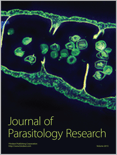
Journal of Parasitology Research
Catalyzing Change in Parasitology and EpidemiologyJournal of Parasitology Research, published by HINDAWI LTD, is a pivotal open-access journal that has been disseminating groundbreaking research in the field of parasitology since 2009. With an ISSN of 2090-0023 and an E-ISSN of 2090-0031, this journal strives to provide researchers, professionals, and students with accessible and high-impact studies that advance understanding of parasitic diseases and their epidemiology. The journal currently holds a Q3 ranking in Infectious Diseases and a Q2 ranking in Parasitology, indicating its significant contribution to the academic community. Furthermore, with a Scopus ranking placing it at #39 in Parasitology and #186 in Infectious Diseases, it plays an essential role in shaping research directions in these fields. As an open-access journal, Journal of Parasitology Research enhances the visibility and accessibility of published works, ensuring crucial findings reach a global audience. With a focus on innovative research, the journal welcomes submissions that explore both theoretical frameworks and practical applications in parasitology, making it an invaluable resource for those dedicated to combating parasitic infections.
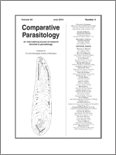
Comparative Parasitology
Bridging Ecology and Evolution in Parasitic StudiesComparative Parasitology, published by the Helminthological Society of Washington, serves as a vital platform for the dissemination of innovative research in the fields of parasitology, ecology, and evolution. With an ISSN of 1525-2647 and an E-ISSN of 1938-2952, this journal has charted a course of academic influence since its inception in 1996, and is set to continue until 2024. Although it currently holds a Q4 ranking in both Ecology, Evolution, Behavior and Systematics and Parasitology categories, it guarantees significant contributions and diverse studies, providing an essential resource for researchers and practitioners in these domains. Located in the United States and managed by Allen Press Inc, Comparative Parasitology emphasizes open access, ensuring that vital research findings are readily available to the global community. The journal remains dedicated to fostering an understanding of the complexities of host-parasite interactions and promoting interdisciplinary collaboration, making it a crucial resource for students and professionals alike.
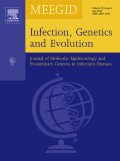
INFECTION GENETICS AND EVOLUTION
Pioneering Research at the Intersection of Genetics and EvolutionINFECTION GENETICS AND EVOLUTION is a premier scholarly journal published by Elsevier, focusing on the dynamic field of infection genetics and evolutionary biology. Since its inception in 2001, this journal has emerged as a critical platform for the dissemination of cutting-edge research, bridging the gap between molecular genetics, evolutionary theory, and infectious disease study. With an influence profound enough to secure its status in the Q1 category for Ecology, Evolution, Behavior and Systematics and impressive Q2 rankings in Genetics, Infectious Diseases, and Microbiology, the journal offers researchers unparalleled insights that advance the understanding of pathogen evolution and host interactions. Despite the lack of Open Access, the research published in this journal significantly contributes to the academic discourse and informs public health approaches. By publishing high-quality studies and reviews through 2024, INFECTION GENETICS AND EVOLUTION remains indispensable for academics, professionals, and students seeking to explore the intricate mechanisms of infection and adaptation in various organisms.
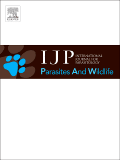
International Journal for Parasitology-Parasites and Wildlife
Advancing Knowledge in Parasite-Host DynamicsThe International Journal for Parasitology-Parasites and Wildlife, published by ELSEVIER, is a premier open-access journal dedicated to advancing the field of parasitology and wildlife research. Established in 2012, this influential journal has garnered a reputation for excellence, as evidenced by its impressive rankings, including Q1 in Animal Science and Zoology and Q2 in both Infectious Diseases and Parasitology as of 2023. With an ISSN of 2213-2244, this journal serves as a critical platform for researchers, professionals, and students, fostering a deeper understanding of parasite-host interactions and their ecological impacts. The journal encourages innovative studies that contribute to the mitigation of infectious diseases and enhance wildlife conservation efforts. With a commitment to open access, the International Journal for Parasitology-Parasites and Wildlife ensures that cutting-edge research is easily accessible to the global scientific community, helping to bridge gaps in knowledge and stimulate further inquiry.
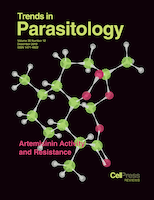
TRENDS IN PARASITOLOGY
Bridging knowledge gaps in infectious disease science.TRENDS IN PARASITOLOGY is a premier academic journal published by CELL PRESS, focusing on the dynamic field of parasitology and infectious diseases. With an ISSN of 1471-4922, this esteemed journal is recognized for its high impact within the research community, boasting a Q1 ranking in both the Infectious Diseases and Parasitology categories as of 2023. This places it among the top-tier journals in the field, as evidenced by its remarkable Scopus rankings, where it ranks #3 out of 79 in Parasitology and #29 out of 344 in Infectious Diseases. Spanning over two decades of scholarly contributions from 2001 to 2024, TRENDS IN PARASITOLOGY emphasizes the latest advancements, challenges, and innovative methodologies in parasitology, making it an invaluable resource for researchers, healthcare professionals, and students alike. With an increasing focus on open access initiatives, this journal not only promotes widespread dissemination of knowledge but also encourages collaboration across the global scientific community. Whether you are investigating novel interventions, exploring parasite evolution, or understanding host-pathogen interactions, TRENDS IN PARASITOLOGY remains at the forefront of research, driving forward the understanding of parasitic diseases.
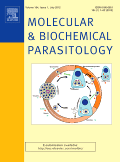
MOLECULAR AND BIOCHEMICAL PARASITOLOGY
Innovating Diagnostic Methodologies for Parasitic Diseases.MOLECULAR AND BIOCHEMICAL PARASITOLOGY is a renowned journal published by Elsevier, focusing on the crucial intersections of molecular biology and parasitology. Since its inception in 1980, this journal has aimed to advance our understanding of parasitic organisms at the biochemical and molecular levels, providing a dedicated platform for researchers studying host-parasite interactions, parasite genetics, and diagnostic methodologies. Although it currently holds a quartile status of Q4 in Molecular Biology and Q3 in Parasitology for the year 2023, it remains a vital resource within the academic community, boasting a variety of research articles, reviews, and case studies that explore innovative treatment strategies and the molecular biology of parasites. Researchers and students alike can benefit from the journal's contributions to the field, despite its traditional publishing model, as the content remains pivotal for ongoing studies and advancements in parasitology.

ISRAEL JOURNAL OF VETERINARY MEDICINE
Bridging Gaps in Veterinary Knowledge for Global ImpactThe Israel Journal of Veterinary Medicine, published by the Israel Veterinary Medical Association, serves as a vital resource for researchers, professionals, and students in the fields of veterinary medicine and animal science. With a commitment to advancing knowledge across diverse veterinary disciplines, this journal plays a crucial role in disseminating significant findings and innovations that influence both local and global veterinary practices. Although it currently holds a Q4 ranking in both the Animal Science and Zoology and Veterinary (miscellaneous) categories, the journal's open access policy, enabling free availability of articles, aspires to increase its accessibility and engagement among the academic community. The journal's convergence of research from 2007 to 2024 showcases its dedication to continuously contributing to the evolving landscape of veterinary science.
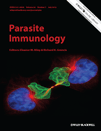
PARASITE IMMUNOLOGY
Exploring the Complexities of Immunological Defense.PARASITE IMMUNOLOGY, published by Wiley, is a leading journal in the field of immunology and parasitology, with an ISSN of 0141-9838 and E-ISSN of 1365-3024. Since its inception in 1979, it has played a pivotal role in advancing our understanding of host-parasite interactions, immunological responses to parasitic infections, and the mechanisms of immunological resistance. The journal is adeptly positioned within the academic community, currently holding a prestigious Q2 ranking in Parasitology and a Q3 ranking in Immunology for 2023, indicating its significant influence and relevance. Its comprehensive scope attracts a diverse readership, contributing to the discourse surrounding novel therapeutic approaches and emerging challenges in parasitic diseases. With a consistent convergence of research until 2024, PARASITE IMMUNOLOGY is an essential resource for researchers, professionals, and students seeking to deepen their knowledge and foster collaboration in these dynamic fields. Although it is not an open-access journal, the insights shared within its pages are invaluable for shaping future research trajectories.